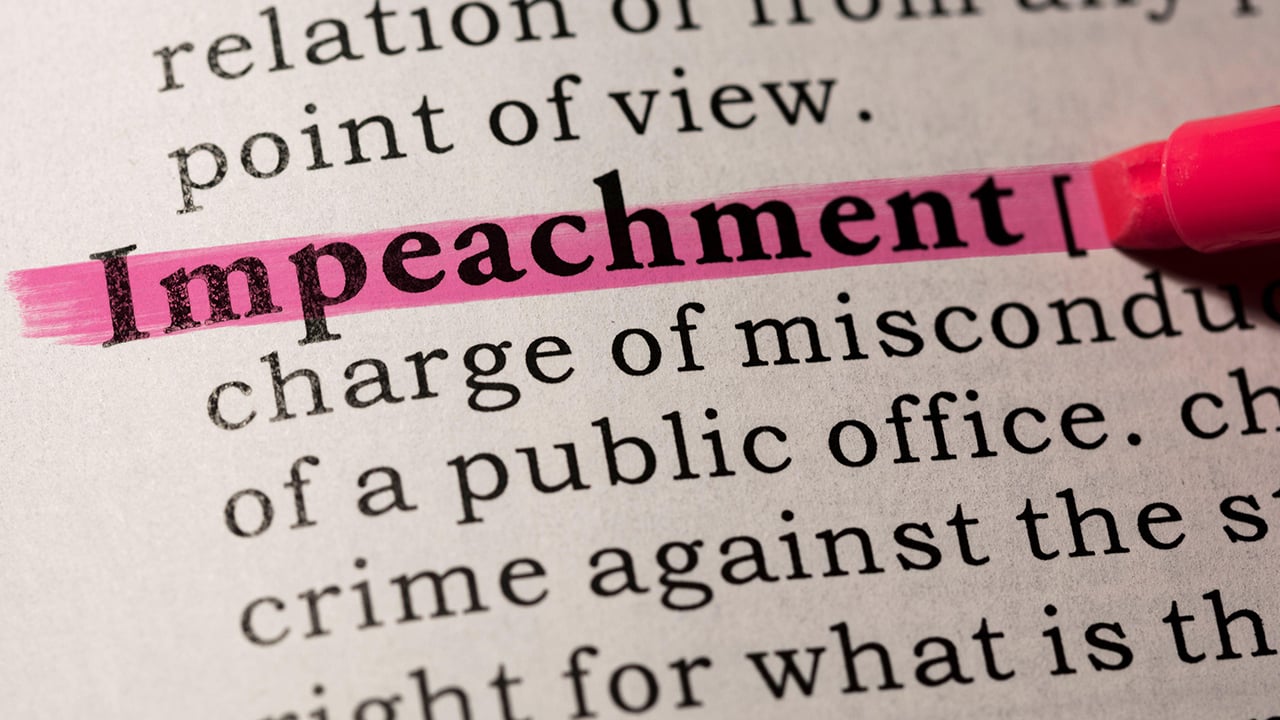
When the House reconvened on Tuesday, September 12, Speaker Kevin McCarthy finally did something to advance an impeachment investigation of President Biden. Before the August break, he had said the next step would be bringing to the floor a resolution to formally authorize an Impeachment Inquiry, but he did not do that. Rather, he simply announced: “Today, I am directing our House committee to open a formal impeachment inquiry into President Joe Biden.”
McCarthy directed three committee chairmen to lead the inquiry: House Oversight Committee Chairman James Comer; House Judiciary Committee Chairman Jim Jordan; and House Ways and Means Committee Chairman Jason Smith. They no doubt will consider Biden’s dealings with Ukraine, Hunter Biden’s family influence peddling, the weaponization of federal law enforcement, dereliction at the border, and more. This inquiry likely will take many months, and if he is impeached, will be followed by a trial in the Senate — but President Biden leaves office in only 16 months — if not re-elected.
The response of the Democrats, who had twice impeached President Trump, was swift, and predictable. Congressman Jamie Raskin (D-MD) asserted: “The Constitution says that the standard for impeachment is treason, bribery and other high crimes and misdemeanors. They don’t have anything like that.” Raskin doesn’t even think it is a close call. Recently, he released a memo claiming that House Republicans had “zero evidence” of actual Biden wrongdoing in the Hunter Biden scandal. This despite emails between Hunter Biden’s business partners referencing “20 for H” and “10 held by H for the big guy?”, which one of the persons who received the email stated was a reference to Vice President Biden.
Unlike Mr. Raskin, others share GOP Congressman Greg Steube’s conviction that Biden’s actions constitute high crimes and misdemeanors. “He has undermined the integrity of his office, brought disrepute on the Presidency, betrayed his trust as President, and acted in a manner subversive of the rule of law and justice at the expense of America’s citizens.”
Politics aside, the central legal issue is whether the actions of President Biden meet the Constitutional standard set out in Article II, Section 4 which allows impeachment for “Treason, Bribery, or other high Crimes and Misdemeanors.” Let’s dive into that issue and consider what sorts of actions meet that standard. It is a complicated question with no certain answer. It took Constitutional scholar Raoul Berger 359 pages to explain Impeachment, but we can hit the high points. See R. Berger, Impeachment: The Constitutional Problems (Harv. Univ. Press: 1999).
First, must a “high Crime and Misdemeanor” be an actual criminal offense? There were many crimes at common law, but it is interesting that the Constitution expressly prescribes only three federal crimes. Article I, Section 8 identifies conspiracy and counterfeiting as federal crimes, and Article III, Section 3 creates the federal crime of treason. Most commentators believe that: “[w]hen the Framers approved the term of art ‘high Crimes and Misdemeanors’ in 1787 … they understood and accepted that it extended to gross misconduct in office that was not confined to criminal offenses.”
At common law, according to Blackstone, “The ‘first and principal high misdemeanor,’ was the gross maladministration of governmental authority by ‘such high officers, as are in public trust and employment,’ and was ‘usually punished by the method of parliamentary impeachment.’” See William Blackstone, IV Commentaries on the Laws of England, “Of Public Wrongs” (1769).
Along that line, Hamilton wrote in Federalist No. 65 that “high Crimes and Misdemeanors” are political offenses, where the society is the victim, not necessarily actual crimes:
those offenses which proceed from the misconduct of public men, or, in other words, from the abuse or violation of some public trust. They are of a nature which may with peculiar propriety be denominated POLITICAL, as they relate chiefly to injuries done immediately to the society itself. [Emphasis added.]
In his Commentaries on the Constitution, Joseph Story followed this same theme:
The offences, to which the power of impeachment has been, and is ordinarily applied, as a remedy, are of a political character. Not but that crimes of a strictly legal character fall within the scope of the power (for, as we shall presently see, treason, bribery, and other high crimes and misdemeanours are expressly within it;) but that it has a more enlargedoperation, and reaches, what are aptly termed, political offences, growing out of personal misconduct, or gross neglect, or usurpation, or habitual disregard of the public interests, in the discharge of the duties of political office. [J. Story, 2 Commentaries on the Constitution, Section 762 (1833) (emphasis added).]
Story suggested that the common law was the best measure of whether an offense was a “high crime or misdemeanor.”
[I]ndeed, political offences are of so various and complex a character, so utterly incapable of being defined, or classified, that the task of positive legislation would be impracticable, if it were not almost absurd to attempt it…. The only safe guide in such cases must be the common law, which is the guardian at once of private rights and public liberties. [Id. at 795 (emphasis added).]
In 1974, considering impeachment of President Nixon, the House Judiciary Committee took the position that a crime was not required, as it noted that “[c]omments in the state ratifying conventions also suggest that those who adopted the Constitution viewed impeachment as a remedy for usurpation or abuse of power or serious breach of trust.” See U.S. House of Representatives, Committee on the Judiciary, “Constitutional Grounds for Presidential Impeachment.” 1974, p. 13.
The Nixon impeachment relied on statements made by Edmund Randolph in the Virginia ratifying convention where he “cited the example of the President’s receipt of presents or emoluments from a foreign power in violation of the constitutional prohibition of article 1, section 9” as an example. Id. at 13 (emphasis added). Future Supreme Court justice James Iredell argued at the North Carolina convention that a President’s giving false information to Congresswould constitute such an offense. Id. at 14 (emphasis added).
The Judiciary Committee report on President Nixon also noted that not all prior impeachments involved crimes:
[e]ach of the thirteen American impeachments [before 1974] involved charges of misconduct incompatible with the official position of the officeholder. This conduct falls into three broad categories: (1) exceeding the constitutional bounds of the powers of the office in derogation of the powers of another branch of government, (2) behaving in a manner grossly incompatible with the proper function and purpose of the office, and (3) employing the power of the office for an improper purpose or for personal gain. [Id. at 17-18 (emphasis added).]
Thus, when Democrats assert that there can be no impeachment without a specific “crime” being committed, that argument is outside of the mainstream of thinking and historical practice about impeachment.
As additional evidence comes forward from the three House Committees investigating President Biden, whether he committed specific crimes will become more clear, but whether or not crimes are shown, his allies in Congress can be trusted to argue none of his actions meet the standard of “high Crimes and Misdemeanors.”
Editor’s Note: To read the articles in this series, please click here.






